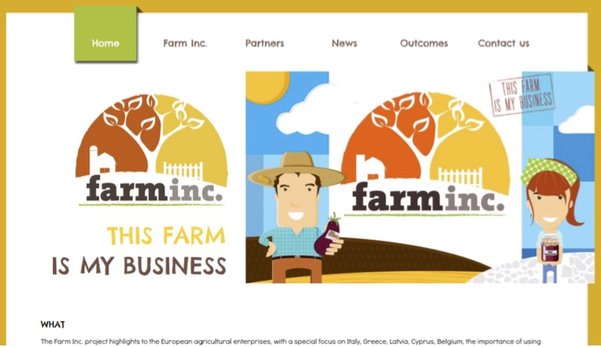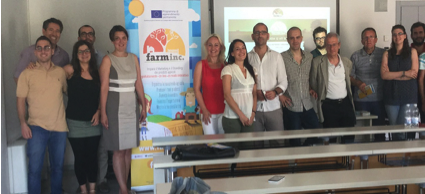Small agricultural enterprises and farmers are often in a disadvantageous position in relation to other bigger players in the food chain. This is why many smaller businesses face a common problem: their efforts to maintain and improve their market position or to upgrade their market share and expand their business activity internationally go unrewarded. Competition is becoming fierce and innovative marketing methods and tools are necessary to increase their bargaining power.
Changes are occurring in both supply and demand structure. On one side, the issue of sustainability is urgent and producers are recognizing the relevance of environmental friendly processes for long lasting economic profits. According to Francis (2011), the limitations of fossil fuels, fresh water, and available farmland, educators are changing focus from strategies to reach maximum yields to those that feature resource use efficiency and resilience of production systems in a less benign climate.
On the other side, consumers are more and more informed about food, through social media and several ICT tools easily affordable, as well as with the growing curiosity pushed by TV programmes and formats on food, cuisine, chefs and gastronomy. Thus, it is worth to understand if consumers are able to acknowledge and appreciate farmers’ efforts to get higher quality food products through sustainable practices and processes. Several research questions become relevant, not only for academicians but also for professionals, practitioners and trainers: how social, ethic and ecologic commitment contribute to products value enhancement? How to communicate this added-value to consumers? How Vocational, Educational and Training (VET) providers and farmers’ associations could support farmers in facing these new challenges?
Farm Inc. project (www.farminc.eu) aims at strengthening the competitiveness of agricultural SMEs as well as to improve the quality of continuous vocational training and the acquisition of skills in the agricultural sector. Farm Inc is a Leonardo da Vinci project targeting agricultural enterprises with a special focus in Italy, Greece, Latvia, Cyprus, Belgium, stressing the importance of using marketing tools such as branding and internationalisation to improve their market position and expand their business internationally.

Image 1: Farm Inc website
During the first step of the project, a research has been carried out to understand farmers’ learning needs at cross-country level. Analysis of results demonstrated that some common requests emerge at European level: understanding local consumers’ needs, increasing level of sales, planning and updating business plans, finding the right distribution channels, making use of synergy and networks.
In terms of desired learning formats, farmers prefer learning through experience rather than classroom training, as demonstrated by the high score reached for activities such as participation to fairs, conferences, farm and study visits, field days. However, VET providers and experts highlight the need to combine practical experience with basic theoretical background, insisting on the method of blended learning. They underline that classroom training helps farmers acquire knowledge of basic marketing concepts while experiential learning helps develop more advanced and specialised skills.
Experiential learning techniques encourage students to directly apply what they are learning, engage in reflection, and then be able to generalize the information outside of the learning environment (Beard & Wilson, 2006). By taking into consideration the dimensions of experiential learning, agricultural educators can create meaningful learning experiences. Kolb (personal communication, September 7, 2010) stated that, “You [teachers] have such an advantage in agricultural education because it is so easily experiential.”
A study conducted by Brown (2011) that investigated the viability and effectiveness of generating and delivering information to farmers via a video-conferencing-based learning approach shows that e-learning has potential as experiential learning approach for farmers.
On the basis of such evidence the The Farm Inc. project has developed a specific tool that offers training in branding, marketing and internationalisation, tailor-made to the needs of small farmers and farmers associations.
The goal has been reached developing an innovative and interactive training tool to facilitate the Farmers learning process. The tool consists in an online platform structured in 6 flexible and integrated Modules. The platform starts with Marketing definitions and theories and it ends with some suggestions on how to face International Markets. Other modules are devoted to Marketing Plans, Farmers' Markets, Quality Products, and the importance of Rural Branding. It can be used as a self-learning tool for Farmers or as an opportunity to integrate official VET systems. The output is innovative because all basic theoretical concepts, practical experiences and self-assessment exercises are integrated into a single training tool, proposed to become the vademecum for marketing in the agricultural sector (a Beta version of the platform is available here: http://farminc-training.gg.dev.militos.org/).

Image 2: One of the Italian Piloting Events
Currently the piloting phase has been completed and the platform is being finalized. On September 27th, the outcomes of the project will be officially presented at EXPO 2015 in Milan at the Italian Pavillion / Biodiversity Park with the presence of Italian and European Institutions. During this conference, all Consortium partners will enjoy to meet all interested VET providers, agricultural entrepreneurs, farmers and their stakeholders to say:”This Farm is MY Business!”
Bibliography:
C. Beard & J. Wilson (2006) Experiential Learning: A Best Practice Handbook for Trainers and Educators, London, Kogan Page.
C.A. Francis, N. Jordan, P. Porter, T. A. Breland, G. Lieblein, L. Salomonsson, N. Sriskandarajah, M. Wiedenhoeft, R. DeHaan, I. Braden & V. Langer (2011) Innovative Education in Agroecology: Experiential Learning for a Sustainable Agriculture, Critical Reviews in Plant Sciences, 30:1-2, 226-237
D. A., Kolb (1984) Experiential learning: Experience as the source of learning and development. Upper Saddle River, NJ: Prentice Hall.